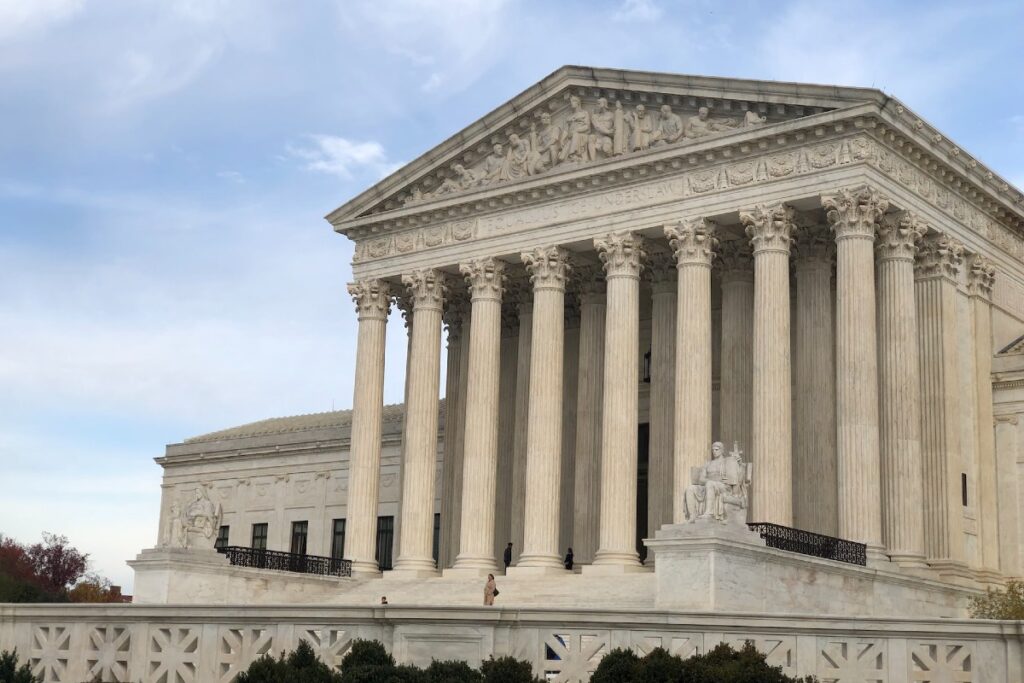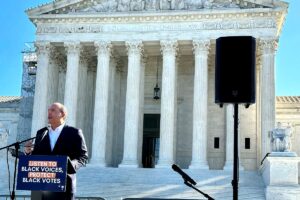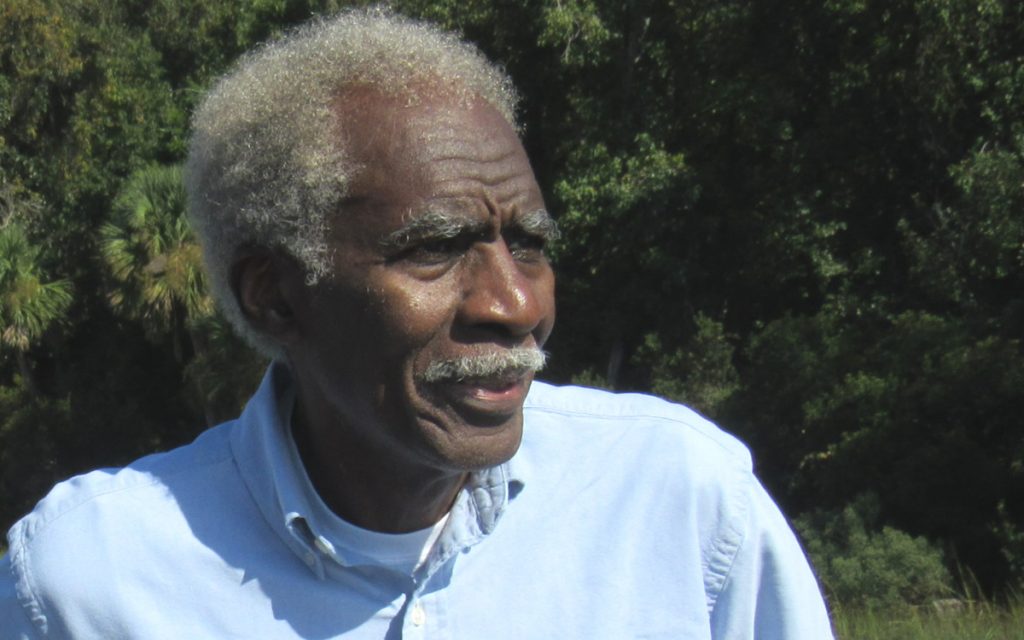STATEHOUSE REPORT | ISSUE 23.21 | May 24, 2024
BIG STORY: Supreme Court upholds 1st District remap
MORE NEWS: McMaster signs 2 bills, vetoes 3 others
LOWCOUNTRY, Ariail: Red on top
COMMENTARY, Brack: Are we going back to the “most terrible days?”
ANOTHER VIEW: S.C. Freedom Caucus isn’t “conservative”
SPOTLIGHT: S.C. Clips
MYSTERY PHOTO: Surrounded by greenery
FEEDBACK: Liked column on Statehouse insanity
U.S. Supreme Court sides with S.C. GOP in gerrymandering case

By Skyler Baldwin | The U.S. Supreme Court voted 6-3 in a May 23 decision to reverse a lower court ruling that struck down a 2021 remap of the state’s First Congressional District.
Last year, a panel of three federal judges ruled the new district map had been racially gerrymandered by the state legislature by moving 30,000 Black voters from Charleston County out of the district.
Today’s decision, however, doesn’t affect this year’s election. Earlier this year, an appellate court ruled that the 2021 map should be used in the 2024 election because the high court had not ruled. But today’s ruling does mean the 2021 map will be used through 2030.
“Today is a dark day for democracy in South Carolina, but all hope is not lost,” Jace Woodrum, executive director of the ACLU of South Carolina said in a press release. “For now, the Supreme Court has upheld a racially gerrymandered map, and South Carolina voters are the ones who will suffer the consequences.”
U.S. Rep. Jim Clyburn, D-S.C., agreed.
“Today’s U.S. Supreme Court decision in Alexander v. South Carolina State Conference of the NAACP is further affirmation that this court has chosen to disenfranchise Black voters and rob us of our fundamental access to the ballot box,” he said in a statement. “Equitable representation is the hallmark of a healthy democracy and in this case, the Supreme Court is attempting to steer the country back to a dark place in our history.”
Redrawn map challenged in 2021

The NAACP immediately challenged the GOP’s 2021 redistricting. After an eight-day trial in late 2022, a three-judge federal panel ultimately concluded the GOP map was an unconstitutional racial gerrymander targeting Black voters.
But because of the lack of a U.S. Supreme Court ruling, a panel of federal judges in March ruled that the 2024 election would proceed under the gerrymandered map. With this ruling, the justices said the Republican-controlled state legislature did nothing wrong during redistricting when it strengthened GOP U.S. Rep. Nancy Mace’s hold on the coastal district by moving 30,000 Democratic-leaning Black residents of Charleston County out of the district.
The ACLU, together with the Legal Defense Fund (LDF) and Arnold & Porter, participated in the 2023 trial that ruled against the map.
“Today’s decision usurps the authority of trial courts to make factual findings of racial discrimination as the unanimous panel found occurred with South Carolina’s design of Congressional District 1,” said Leah Aden, senior counsel at LDF. “The decision also defies decades of precedent that allows plaintiffs to use a wide variety of evidence to demonstrate racial discrimination in voting and forces plaintiffs to offer a particular form of proof that race more than party explains South Carolina’s line-drawing.”
A dissenting opinion today by Justice Elena Kagan, joined by justices Sonia Sotomayer and Ketanji Brown Jackson, accused the majority justices of cherry-picking evidence presented during the lower court proceedings.
“The proper response to this case is not to throw up novel roadblocks enabling South Carolina to continue dividing citizens along racial lines,” Kagan wrote. “It is to respect the plausible — no, the more than plausible — findings of the district court that the state engaged in race-based districting. And to tell the state that it must redraw District 1, this time without targeting African-American citizens.”
The majority opinion penned by Justice Samuel Alito, however, said that the district court’s findings were “clearly erroneous.” Race and politics “closely correlate” in South Carolina, and voters who challenged the congressional lines failed to provide direct evidence of a racial gerrymander, the Supreme Court said.
“Where race and partisan preferences are very closely tied, as they are here, the mere fact that District 1’s BVAP stayed more or less constant proves very little,” Alito wrote. “If 100% of Black voters voted for Democratic candidates, it is obvious that any map with the partisan breakdown that the legislature sought in District 1 — something in the range of 54% Republican to 46% Democratic — would inevitably involve the removal of a disproportionate number of Black voters.
“And since roughly 90% of Black voters cast their ballots for Democratic candidates, the same phenomenon is very likely,” he added.
First District Democratic candidate Mac Deford, who witnessed oral arguments at the U.S. Supreme Court in October 2023, reaffirmed his previous stance against the earlier map.
“We are deeply disappointed by the Supreme Court’s decision, which we believe fails to protect the fundamental rights of African American voters in our state,” Deford said in a press release. “However, our campaign has been prepared for this outcome, and we remain confident that we will flip this district.
“While we believe that the Roberts Court has once again ignored Black voters, we will not be deterred in our resolve to fight for every vote and ensure that all our citizens’ voices are heard.”
- Skyler Baldwin is a reporter with the Charleston City Paper. Have a comment? Send to: feedback@statehousereport.com.
McMaster signs gender, antisemitism bills, vetoes 3 others

By Jack O’Toole | S.C. Gov. Henry McMaster signed high-profile bills this week limiting gender care for minors and defining antisemitism under state law. He also vetoed bills that would expunge the criminal records of individuals convicted of certain gun, alcohol and fraudulent check offenses.
Saying it “protects our children,” McMaster signed H. 4619, dubbed the Help Not Harm Act by supporters, into law on May 21. The legislation bans what it defines as “irreversible” gender care treatments, including puberty blockers, cross-sex hormones and surgeries, for minors under the age of 18. It also excludes gender treatments from coverage under the state’s Medicaid program.
On May 24, McMaster joined legislators and citizens at a public signing ceremony for H. 4042, which formally adopts the International Holocaust Remembrance Alliance definition of antisemitism as S.C. law. Defining the term as “a certain perception of Jews,” which can manifest as hatred, violence and certain types of rhetoric, the language has been adopted by 35 states, 91 cities and the US State Department. Despite this broad support, First Amendment groups of the left and right have raised concerns about its potential impact on free speech.
“South Carolina has long stood with Israel and with our Jewish community, which has a long proud history in our state,” McMaster said in a statement. “This bill signing sends a clear and unified message that South Carolina will continue to stand firm against antisemitism.”
In addition to the signings, McMaster, a former state attorney general, issued his first three vetoes of the year, all of which involved bills that would offer expungements of criminal records.
The first would have eliminated prior convictions for carrying handguns without a permit, which is now legal in the state. The second would have expunged the records of people convicted of selling alcohol to minors after completion of an education program. The third would have offered expungements to offenders who passed multiple bad checks 10 years after their last offense.
“The critical point,” McMaster wrote, regarding the gun-related expungements, “(is) that the actions were illegal at the time they were committed.”
The state legislature is expected to take up the governor’s vetoes when it returns for a special session in June.
In other recent headlines:
![]() Medicaid expansion could soon be on the table in Palmetto State. S.C. Sen. Tom Davis, R-Beaufort, said South Carolina could soon start conversations about expanding Medicaid as part of larger discussions about reforming the healthcare market in the state.
Medicaid expansion could soon be on the table in Palmetto State. S.C. Sen. Tom Davis, R-Beaufort, said South Carolina could soon start conversations about expanding Medicaid as part of larger discussions about reforming the healthcare market in the state.
How state lawmakers can save blue crabs. According to an editorial in The Post and Courier, “The human population increase along South Carolina’s coast and the stricter crabbing regulations in neighboring states have combined to put unprecedented stress on the population of blue crabs. That’s why we have urged state lawmakers to pass stricter rules for both commercial and recreational crabbers to give the crabs a better chance to bounce back.”
S.C. drunken drivers will have to use ignition locking device under new law. People who have previously refused a breathalyzer test or been convicted of driving under the influence will now have to install an ignition interlock device, which prevents the vehicle from starting if they’ve been drinking.
South Carolina can enforce abortion ban. State Circuit Judge Daniel Coble ruled recently that the state’s ban on abortions after the sixth week of pregnancy can be enforced while courts consider an appeal to the law.
Law license suspended for Pendarvis. The S.C. Supreme Court has suspended the law license of state Rep. Marvin Pendarvis, D-Charleston, after he was accused by a client of forging a signature to reach a lawsuit settlement.
Red on top

Nationally award-winning cartoonist Robert Ariail always has an interesting take. This week, he found a way to make a joke about cicadas and MAGAites. What do you think – love the cartoon? Hate it? Send your thoughts to feedback@statehousereport.com.
Are we going back to the “most terrible days?”

By Andy Brack | Something that Emory Campbell, the sage of Hilton Head Island, said in 2018 has been rumbling around my head as South Carolina marches backward toward more discrimination against Black voters, transgender students and women who want to make decisions about their bodies.
 At that time with Donald Trump in the White House whipping up people with “Make America Great Again” sloganeering, many Black South Carolinians saw an attempt to turn back the clock. And many throwback Republicans, from governors to regular guys, weren’t shy about glorifying the past, just as many Southerners hold on to the myth of the Lost Cause of the Civil War.
At that time with Donald Trump in the White House whipping up people with “Make America Great Again” sloganeering, many Black South Carolinians saw an attempt to turn back the clock. And many throwback Republicans, from governors to regular guys, weren’t shy about glorifying the past, just as many Southerners hold on to the myth of the Lost Cause of the Civil War.
Campbell was talking about that old Palmetto State bugaboo, race. He sat in a comfortable brown rocking chair on a porch at the Penn Center, the cherished St. Helena Island school turned nonprofit.
“It’s more open, this business of race and differences and class and gender. It’s coming now from the top, openly,” he said. “When i grew up it was coded. Politicians, it seemed like, our elected officials were more polite about how they said it. Now it’s naked, it’s pretty open. I never seen so many official rallies that shout at you – shouts out the flavor of racism.”
He said the Make America Great Again rhetoric was frightening.
“That was meaning that we’re going to go back – we want to go back to the ‘good old days’ which means those are the days that were the most terrible days in my life, where I couldn’t go into a lunch counter and eat as I pleased. I couldn’t go into a movie . Or I couldn’t go to the white school.
“We had two buses. The schools were about a half a mile apart. The white kids waved at me as they went that way and we went that [other] way. That was a great America in terms of what they’re saying now.”
Now Trump, empowered and fueled by angry hordes of right-wing zealots and acolytes, is trying to take back power to create what many fear as an authoritarian state. It didn’t help that earlier this week, during his felony trial in New York, his campaign shared a slick video with Hitlerian-sounding language talking about plans for a “unified Reich.”
What seems to be happening in South Carolina and across the country is there’s a growing institutional disappointment. Progressives and liberals see a compromised U.S. Supreme Court that is handing down decisions taking away rights from women who want abortions and voting power from Blacks in the First Congressional District. They’re unsettled by new institutional discrimination emanating from the Statehouse against transgender students. They worry about attacks on public education by steering public money into ill-considered private vouchers.
On the other side of a very wide aisle are voters who are reacting with anger, not disappointment, in democratic institutions. They’re mad that Congress can’t get its act together on reasonable immigration policy. They want the current president’s son to go to jail just because their favored president, Trump, has been tarred and feathered in the media for his corruption. They’re irritated at anything that smacks of liberalism, reasonable consideration for people who don’t look like them and any possible attempt to control the epidemic of gun violence.
America’s culture wars and polarized electorate have turned into America’s battle for the future.
If we don’t find a way to unify as one nation of America, a new season of secession may be around the corner.
Andy Brack is editor and publisher of Statehouse Report and the Charleston City Paper. Have a comment? Send to: feedback@statehousereport.com.
S.C. Freedom Caucus isn’t “conservative”

NOTE: This opinion first was published in the Charleston City Paper.
Any number of “c” words spring to mind when one thinks of the so-called South Carolina House Freedom Caucus: combative, corrosive, childish, churlish, chuckleheaded and crazypants, just to name just a few. One that doesn’t or at least shouldn’t? Conservative. Because the S.C. Freedom Caucus, with its taste for institutional vandalism and radical policy demands, is anything but that.
Ready to put a scared 17-year-old girl to death for getting an abortion? Members of the S.C. Freedom Caucus sponsored a bill to make it happen (H-3549). Looking to refight the nullification crisis of 1833? Again, the Freedom Caucus can help (H-3539). Or how about sowing distrust in our electoral institutions by falsely accusing state employees of trying to register non-citizens to vote? Yeah, the Freedom Caucus has got you covered there, too.
Of course, the 17 caucus members hate it when anyone points out any of this. After all, hijacking the popular word “conservative” — turning it into a synonym for hormonal right-wing rage, rather than a generally honorable set of political commitments — is key to their electoral strategy. Without appropriation of the “conservative” label, they’re just one more gang of angry crackpots ALL CAPPING their way through another long and lonely day on X or other social media.
So the task for mainstream Republicans this primary season is to remind South Carolinians what conservatism actually stands for — and to unapologetically retake the word from the dilettantes.
“To be conservative,” the political theorist Michael Oakeshott said in his famous definition of the term, “is to prefer the familiar to the unknown, to prefer the tried to the untried, fact to mystery, the actual to the possible, the limited to the unbounded, the near to the distant, the sufficient to the superabundant, the convenient to the perfect, present laughter to utopian bliss.” Or as National Review founder William F. Buckley more pithily put it, “A conservative is someone who stands athwart history, yelling ‘Stop.’ ”
Put simply, conservatism is less a political ideology and more a philosophical argument for slow, evolutionary change in government, society and culture. (Although, truth be told, if you look at recent fast changes on guns, abortion and sex emanating from Columbia, you may wonder who are the real conservatives.)
Everyday conservatism views established institutions and traditions as storehouses of hard-won and all-too-easily forgotten wisdom. It warns against grand schemes and unintended consequences. It sees rashness in passion, peril in certainty, folly in zeal, and danger in disorder.
In other words, it should exist to oppose every radical and irresponsible move the S.C. Freedom Caucus makes, from recent and unwarranted attacks on our state’s electoral system to extreme and often just plain kooky legislation that seeks to suddenly change our state in ways we can hardly imagine.
Long story short, there’s a reason Lexington Republican Rep. Micah Caskey — a Marine Corps veteran of Iraq and Afghanistan and longtime man of the right — recently donned a tinfoil hat to mock Freedom Caucus members on the House floor. And it wasn’t because they’re “ultra-conservative.” It was because they aren’t conservative at all.
GOP voters need to keep all of this in mind when they find themselves staring at a Freedom Caucus name on a primary ballot. Perhaps they’d like to consider a conservative instead.
S.C. Clips
 Statehouse Report is brought to you weekly at no cost thanks to our underwriters. In the spotlight today is SC Clips, an affordable, daily information digest that provides you with the South Carolina news you need every business day. Subscribers receive a daily email news round-up before 10 a.m. that provides a link to each day’s edition of SC Clips.
Statehouse Report is brought to you weekly at no cost thanks to our underwriters. In the spotlight today is SC Clips, an affordable, daily information digest that provides you with the South Carolina news you need every business day. Subscribers receive a daily email news round-up before 10 a.m. that provides a link to each day’s edition of SC Clips.
Each issue (click for sample) provides a concise summary of dozens of the latest newspaper and television reports of news with statewide impact, politics, business and local stories. Readers also are linked to key opinions by South Carolina’s editorial writers.
- Learn more about this great news service that will save you time — which saves you money.
- Get a trial run at no cost.
Surrounded by greenery

Here’s an interesting old building that a reader sent of a place omewhere in South Carolina. It looks pretty cozy, surrounded by greenery. What and where is it? Send your name, hometown and guess to: feedback@statehousereport.com.
 Last week’s mystery, “Now and then,” showed a 1907 postcard of the old Hartsville Cotton Mill, which Allan Peel of San Antonio, Texas, writes was built in 1907. “The site is now the campus of the South Carolina Governor’s School for Science and Mathematics, a public boarding high school for students in grades 11 and 12, that concentrates on science and mathematics but offers a full spectrum of the arts and humanities studies as well.”
Last week’s mystery, “Now and then,” showed a 1907 postcard of the old Hartsville Cotton Mill, which Allan Peel of San Antonio, Texas, writes was built in 1907. “The site is now the campus of the South Carolina Governor’s School for Science and Mathematics, a public boarding high school for students in grades 11 and 12, that concentrates on science and mathematics but offers a full spectrum of the arts and humanities studies as well.”
Bill Segars, who lives in Hartsville, says there’s little left of the old mill. “I am glad to say that there are efforts being made now to rehabilitate the’”MIll Village’ community, which adjoins the mill property, for present day housing. Unfortunately today, there are no signs of the original mill building remaining, which was owned by Milliken & Company when it was given to the S.C. Department of Education for the new South Carolina Governor’s School for Science and Mathematics. There was an effort made to save the chimney, but it was not stable enough to leave as a freestanding feature.”
Readers guessed several other mills, but the others who who correctly identified the Hartsville mill were longtime sleuths: Jacie Godfrey of Florence, George Graf of Palmyra, Va.; Pat Keadle of Wagener; and Jay Altman of Columbia.
- Send us a mystery picture. If you have a photo that you believe will stump readers, send it along (but make sure to tell us what it is because it may stump us too!) Send to: feedback@statehousereport.com and mark it as a photo submission. Thanks.
Liked column on Statehouse insanity
To the editor:
![]() I just read your opinion piece on the S.C legislature in the May 16-22 edition of The Island News, and I wanted to thank you for shining a light on the insanity being passed off as legislating/governing in Columbia.
I just read your opinion piece on the S.C legislature in the May 16-22 edition of The Island News, and I wanted to thank you for shining a light on the insanity being passed off as legislating/governing in Columbia.
Keep fighting that good fight! You are not alone in your opinion.
– Mike Bogle, Beaufort
Send us your thoughts
We encourage you to send in your thoughts about policy and politics impacting South Carolina. We’ve gotten some letters in the last few weeks – some positive, others nasty. We print non-defamatory comments, but unless you provide your contact information – name and hometown, plus a phone number used only by us for verification – we can’t publish your thoughts.
- Have a comment? Send your letters or comments to: feedback@statehousereport.com. Make sure to provide your contact details (name, hometown and phone number for verification. Letters are limited to 150 words.
- ORDER NOW: Copies are in Lowcountry-area bookstores now, but if you can’t swing by, you can order a copy online today.
- Now available as an e-book!
ABOUT STATEHOUSE REPORT
Statehouse Report, founded in 2001 as a weekly legislative forecast that informs readers about what is going to happen in South Carolina politics and policy, is provided to you at no charge every Friday.
- Editor and publisher: Andy Brack, 843.670.3996
- Statehouse bureau chief: Jack O’Toole
Donate today
We’re proud to offer Statehouse Report for free. For more than a dozen years, we’ve been the go-to place for insightful independent policy and political news and views in the Palmetto State. And we love it as much as you do.
But now, we can use your help. If you’ve been thinking of contributing to Statehouse Report over the years, now would be a great time to contribute as we deal with the crisis. In advance, thank you.
Buy the book
Now you can get a copy of editor and publisher Andy Brack’s We Can Do Better, South Carolina! ($14.99) as a paperback or as a Kindle book ($7.99). . The book of essays offers incisive commentaries by editor and publisher Andy Brack on the American South, the common good, vexing problems for the Palmetto State and interesting South Carolina leaders.
More
- Mailing address: Send inquiries by mail to: P.O. Box 21942, Charleston, SC 29413
- Subscriptions are free: Click to subscribe.
- We hope you’ll keep receiving the great news and information from Statehouse Report, but if you need to unsubscribe, go to the bottom of the weekly email issue and follow the instructions.
- Read our sister publication: Charleston City Paper (every Friday in print; Every day online)
- © 2024, Statehouse Report, a publication of City Paper Publishing, LLC. All rights reserved.


